Charles E W Bean, Diaries, AWM38 3DRL 606/238/1 - March 1917 - Part 4
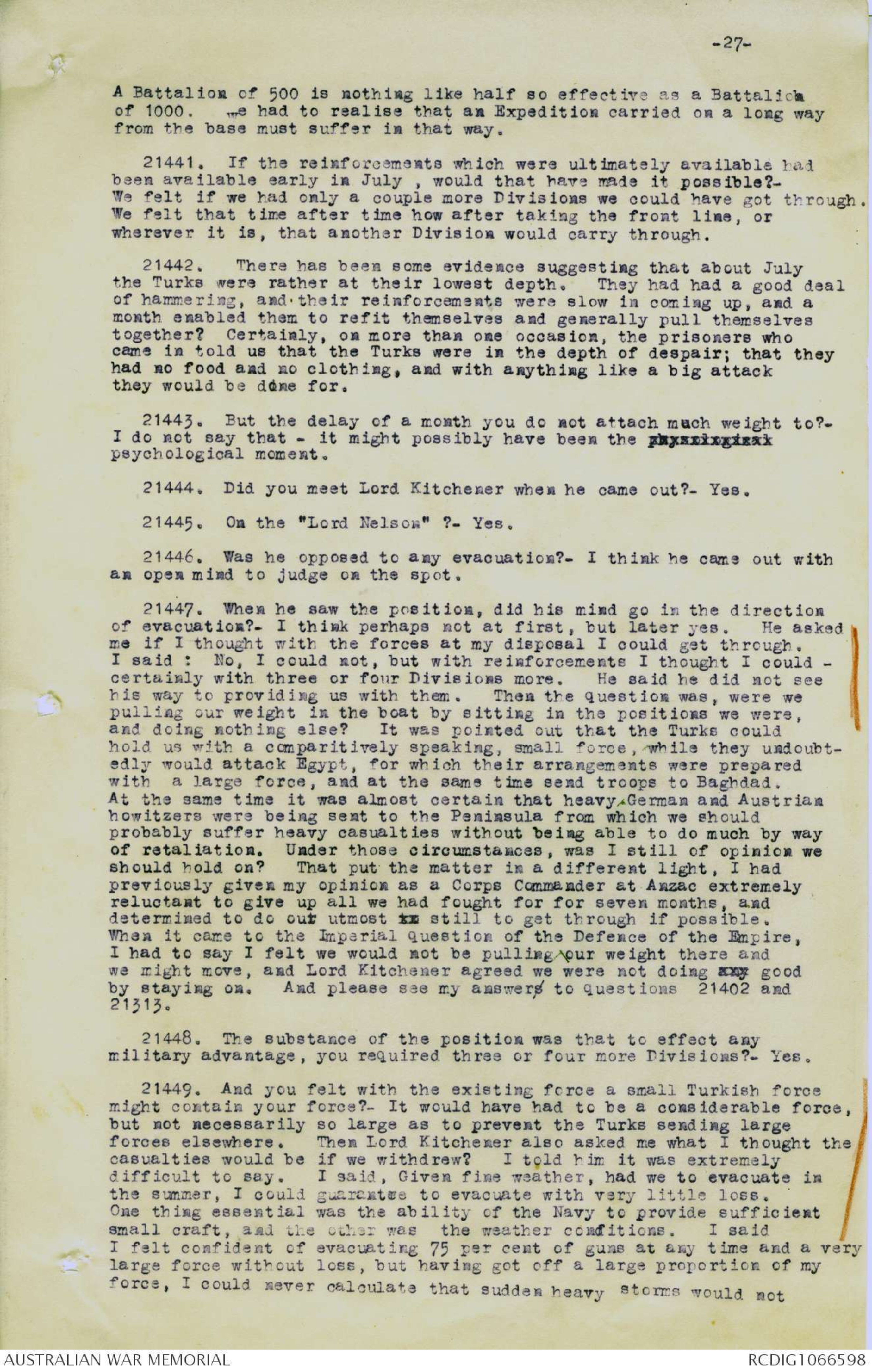
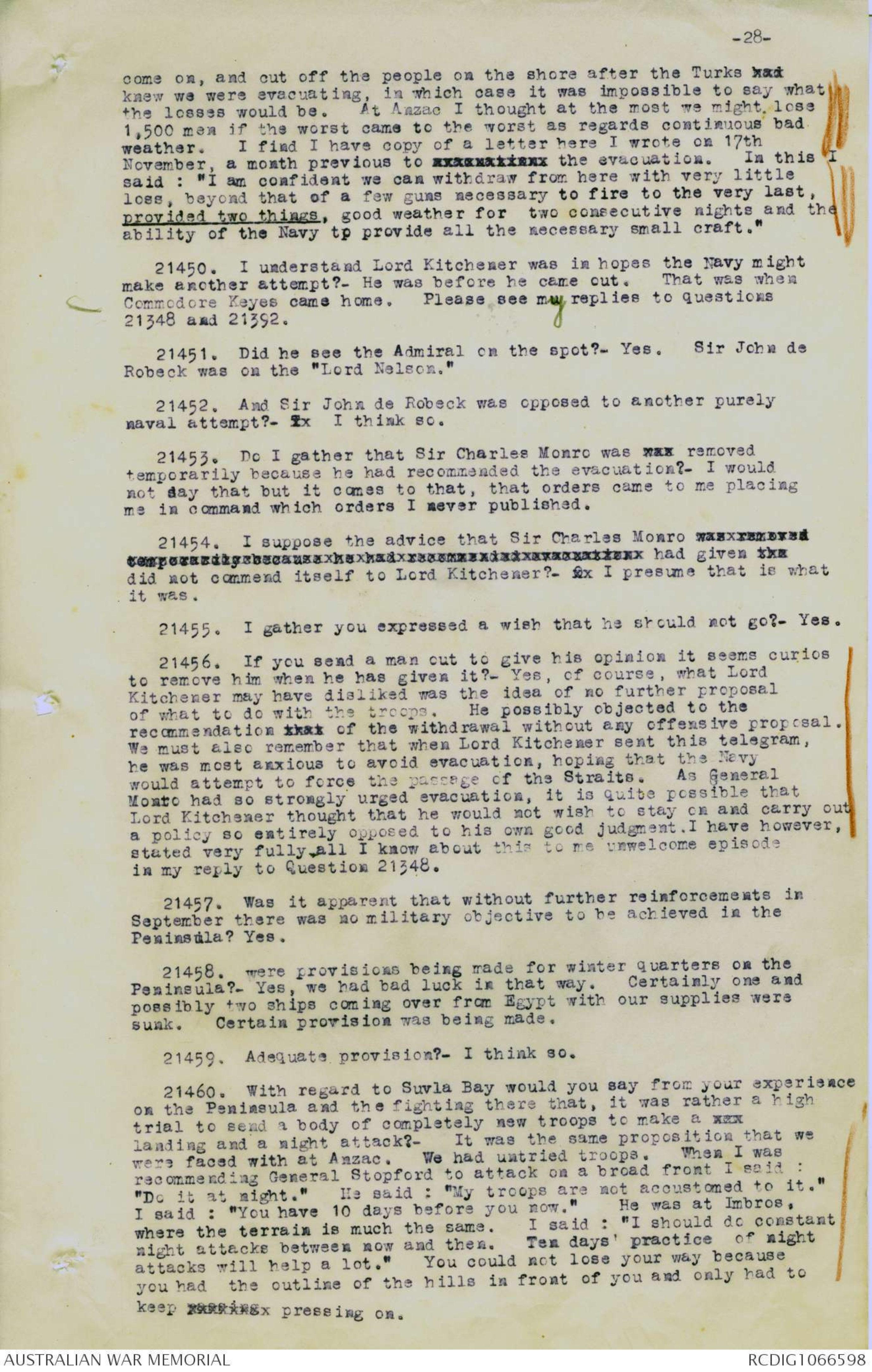
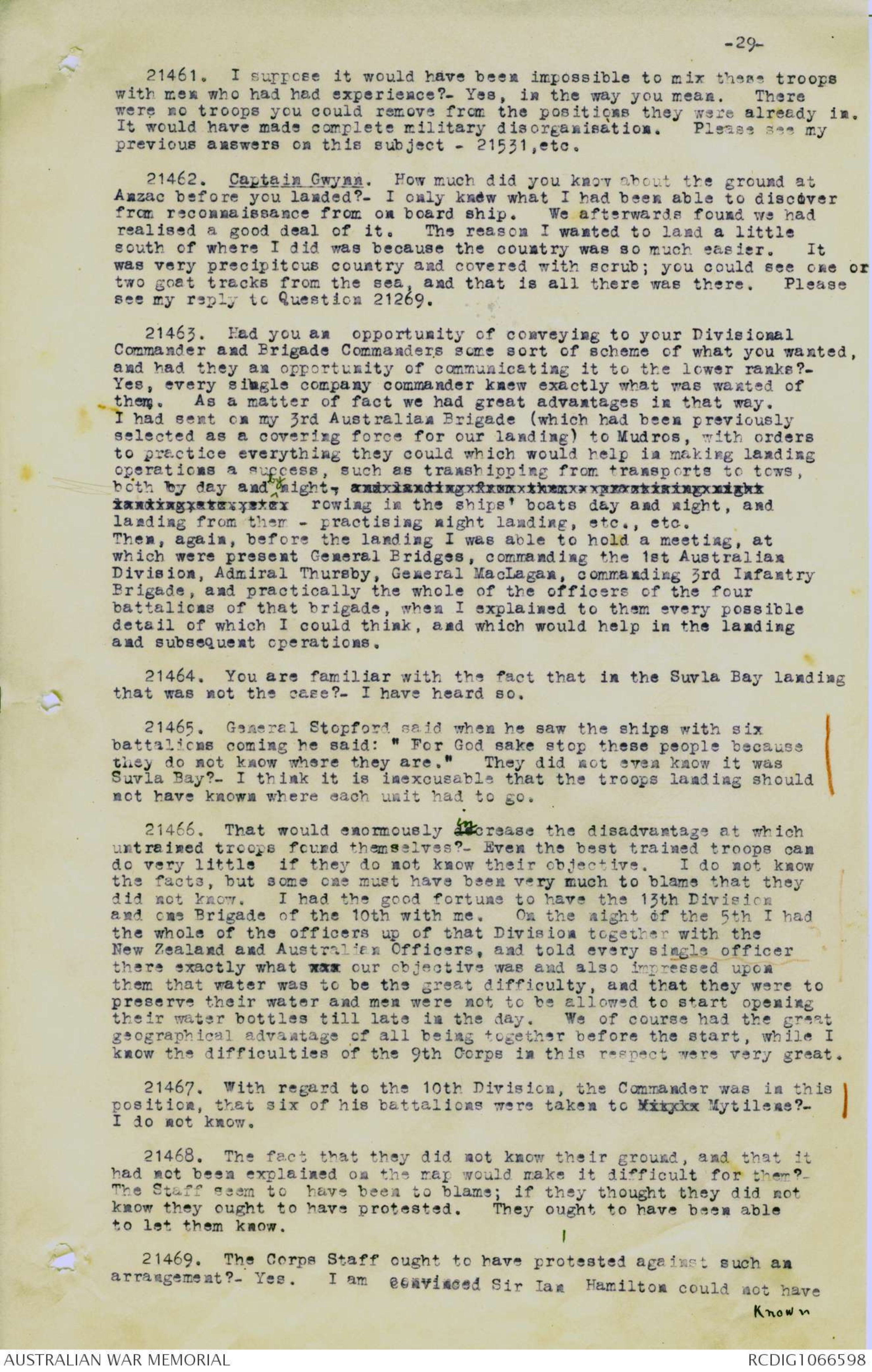
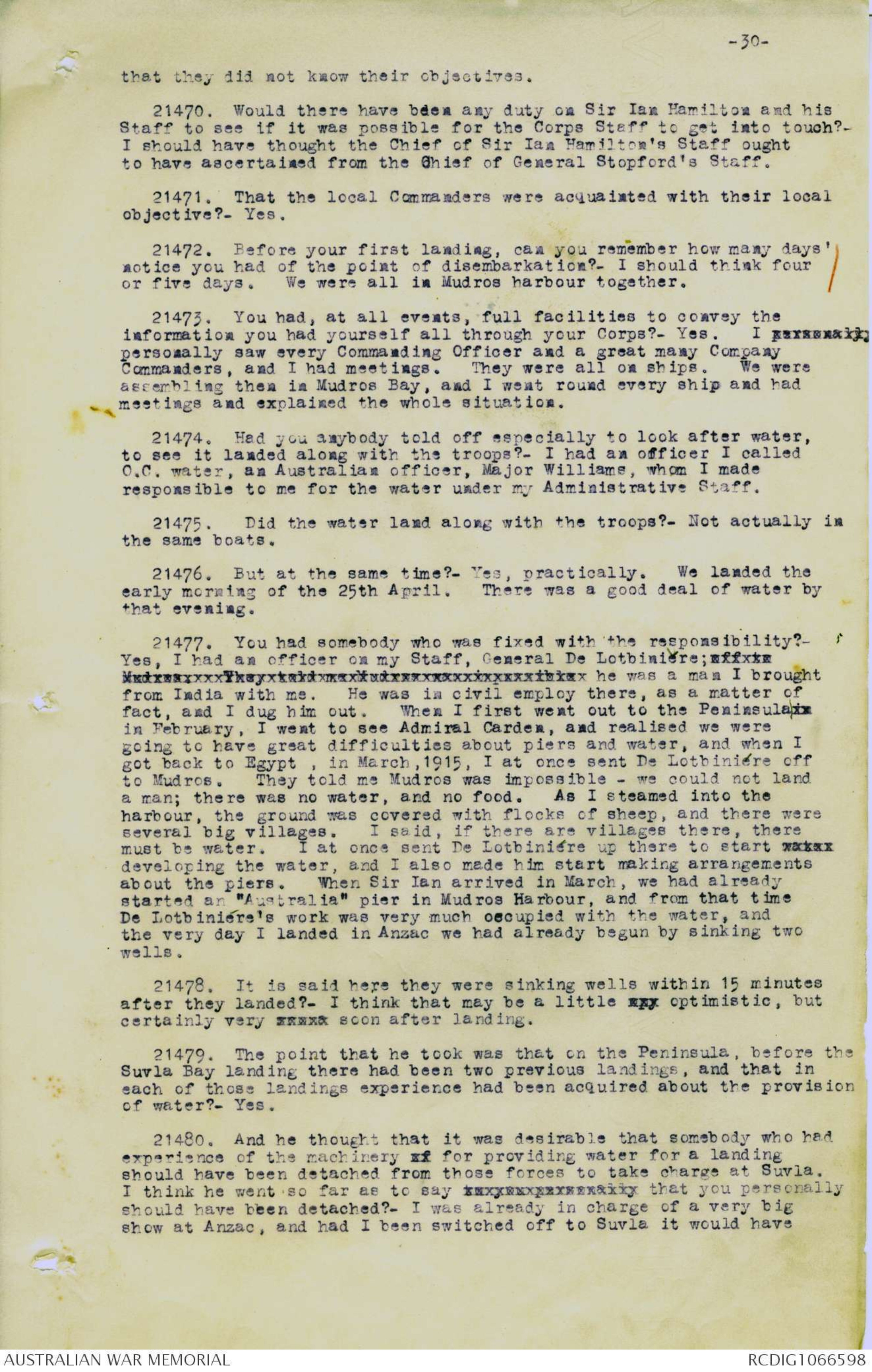
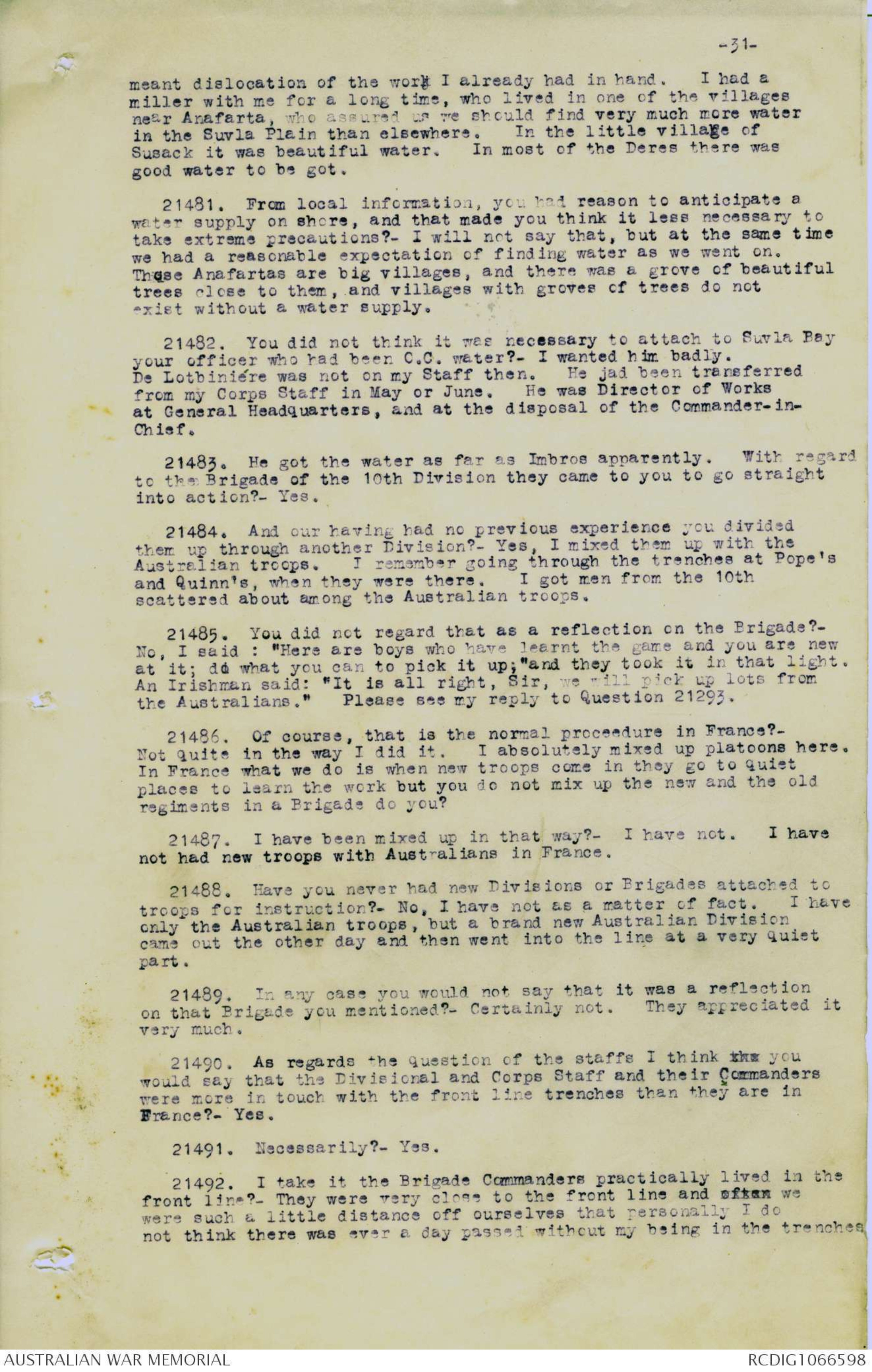
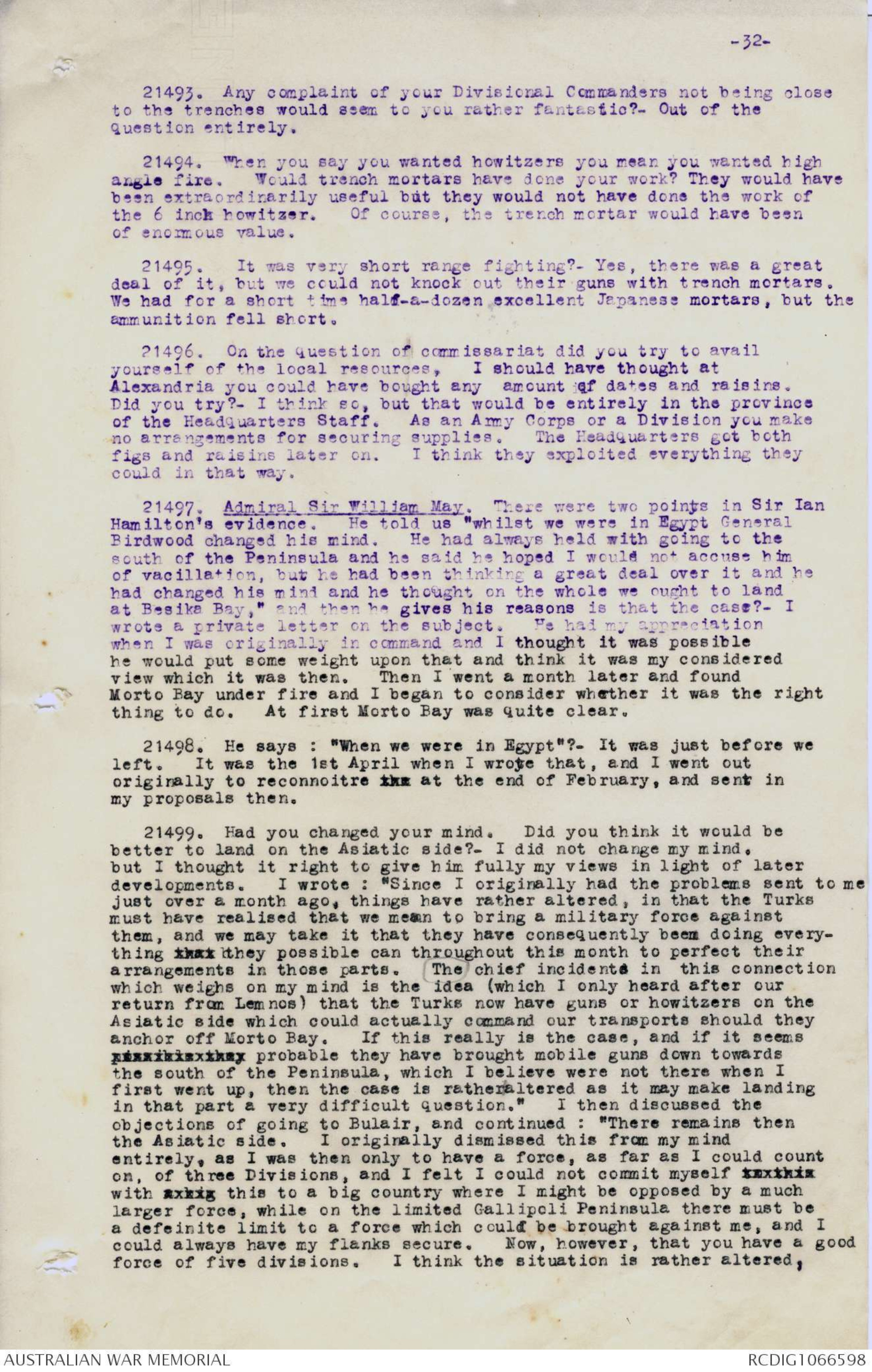
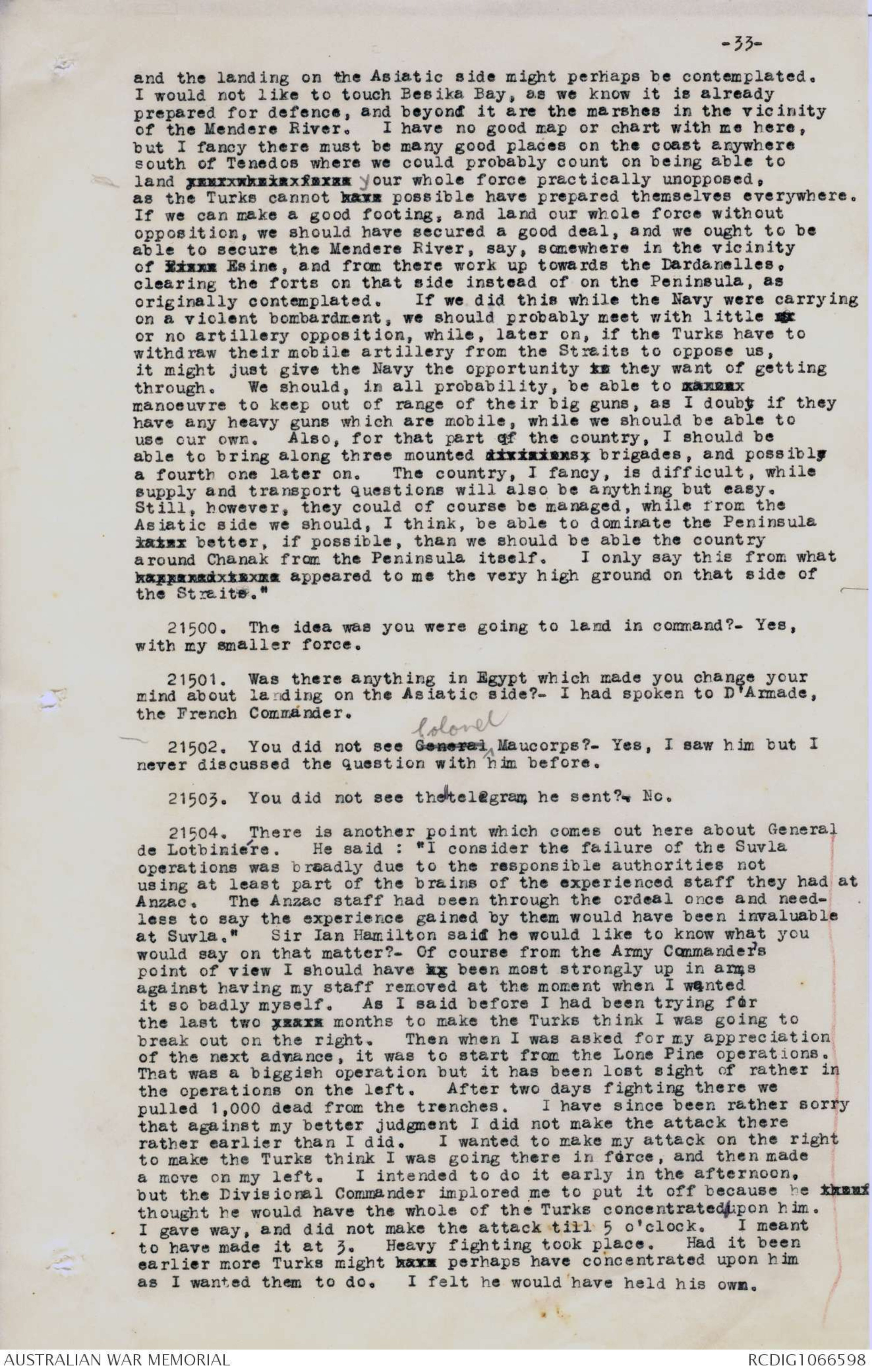
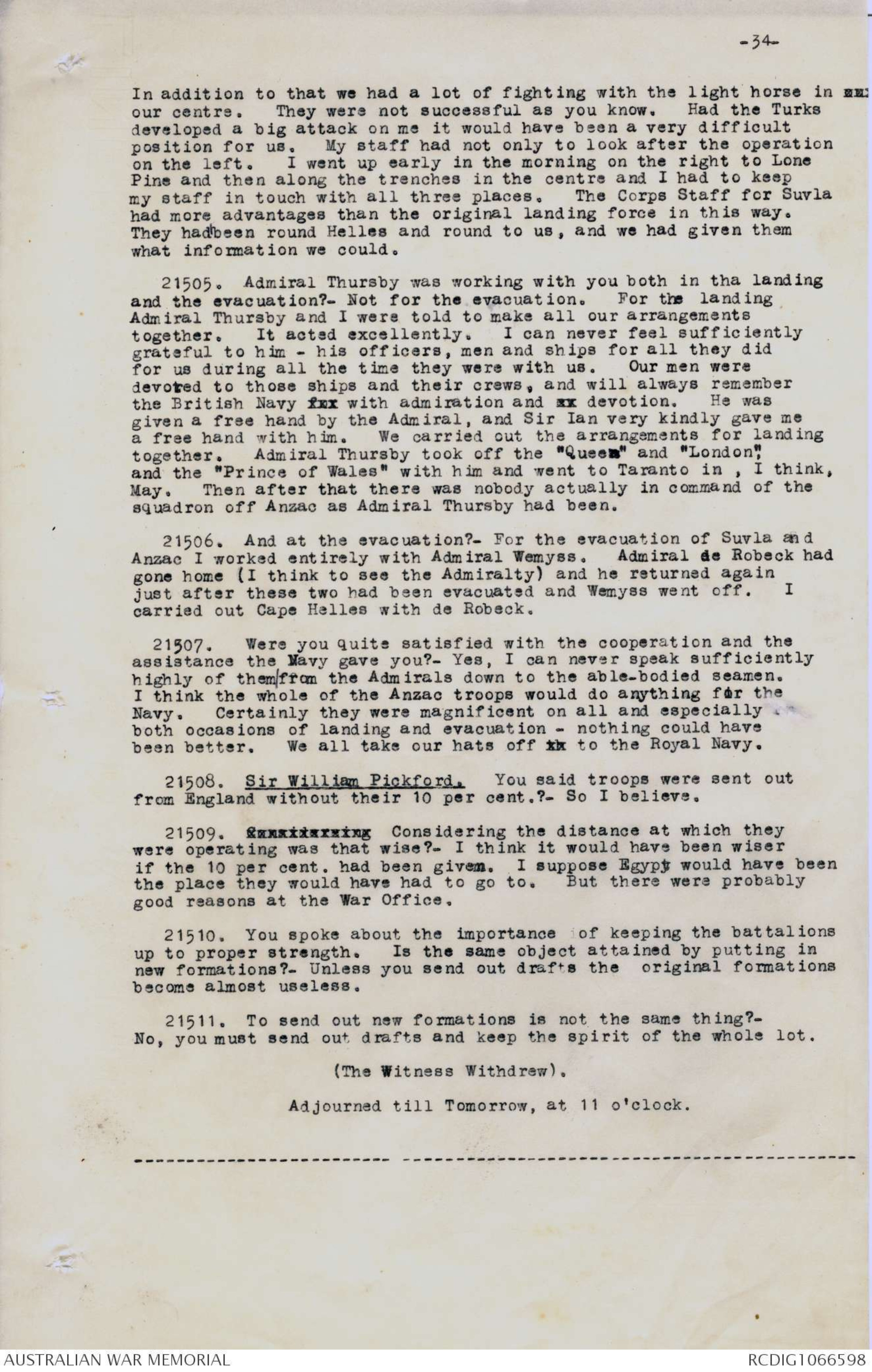
-27 -
A Battalion of 500 is nothing like half so effective as a Battalion
of 1000. We had to realise that an Expedition carried on a long way
from the base must suffer in that way.
21441. If the reinforcements which were ultimately available had
been available early in July, would that have made it possible?-
We felt if we had only a couple more Divisions we could have got through
We felt that time after time how after taking the front line, or
wherever it is, that another Division would carry through.
21442. There has been some evidence suggesting that about July
the Turks were rather at their lowest depth. They had had a good deal
of hammering, and their reinforcements were slow in coming up, and a
month enabled them to refit themselves and generally pull themselves
together? Certainly, on more than one occasion, the prisoners who
came in told us that the Turks were in the depth of despair; that they
had no food and no clothing, and with anything like a big attack
they would be done for.
21443. But the delay of a month you do not attach much weight to?-
I do not say that - it might possibly have been the physological
psychological moment.
21444. Did you meet Lord Kitchener when he came out?- Yes.
21445. On the "Lord Nelson” ?- Yes.
21446. Was he opposed to any evacuation?- I think he came out with
an open mind to judge on the spot.
21447. When he saw the position, did his mind go in the direction
of evacuation?- I think perhaps not at first, but later yes. He asked
me if I thought with the forces at my disposal I could get through.
I said: No, I could not, but with reinforcements I thought I could -
certainly with three or four Divisions more. He said he did not see
his way to providing us with them. Then the question was, were we
pulling our weight in the boat by sitting in the positions we were
and doing nothing else? It was pointed out that the Turks could
hold us with a comparitively speaking, small force, while they undoubtedly
would attack Egypt, for which their arrangements were prepared
with a large force, and at the same time send troops to Baghdad.
At the same time it was almost certain that heavy German and Austrian
howitzers were being sent to the Peninsula from which we should
probably suffer heavy casualties without being able to do much by way
of retaliation. Under those circumstances, was I still of opinion we
should hold on? That put the matter in a different light, I had
previously given my opinion as a Corps Commander at Anzac extremely
reluctant to give up all we had fought for for seven months, and
determined to do our utmost to still to get through if possible.
When it came to the Imperial question of the Defence of the Empire,
I had to say I felt we would not be pulling our weight there and
we right move, and Lord Kitchener agreed we were not doing any good
by staying on. And please see my answers to questions 21402 and
21313.
21448. The substance of the position was that to effect any
military advantage, you required three or four more Divisions?- Yes.
21449. And you felt with the existing force a small Turkish force
might contain your force?- It would have had to be a considerable force,
but not necessarily so large as to prevent the Turks sending large
forces elsewhere. Then Lord Kitchener also asked me what I thought the
casualties would be if we withdrew? I told him it was extremely
difficult to say. I said, Given fine weather, had we to evacuate in
the summer, I could guarantee to evacuate with very little loss.
One thing essential was the ability of the Navy to provide sufficient
small craft, and the other was the weather conditions. I said
I felt confident of evacuating 75 per cent of guns at any time and a very
large force without loss, but having got off a large proportion of my
force, I could ever calculate that sudden heavy storms would not
-28-
come on, and cut off the people on the shore after the Turks had
knew we were evacuating, in which case it was impossible to say what
the losses would be. At Anzac I thought at the most we might lose
1,500 men if the worst came to the worst as regards continuous bad.
weather. I find I have copy of a letter here I wrote on 17th
November, a month previous to xxxxxxxxxxx the evacuation. In this
said: "I am confident we can withdraw from here with very little
loss, beyond that of a few guns necessary to fire to the very last
provided two things, good weather for, two consecutive nights and the
ability of the Navy to provide all the necessary small craft."
21450. I understand Lord Kitchener was in hopes the Navy might
make another attempt?- He was before he came out. That was when
Commodore Keyes came home. Please see muy replies to questions
21348 and 21392.
21451. Did he see the Admiral on the spot?- Yes. Sir John de
Robeck was on the "Lord Nelson."
21452. And Sir John de Robeck was opposed to another purely
naval attempt?- Tx I think so.
21453. Do I gather that Sir Charles Monro was xxx removed
temporarily because he had recommended the evacuation?- I would
not say that but it comes to that, that orders came to me placing
me in command which orders I never published.
21454. I suppose the advice that Sir Charles Monro was removedtemporarily because he hadxxxxxxxxxxxxxxxxxxxxxx had given the
did not commend itself to Lord Kitchener?- Ox I presume that is what
it was.
21455. I gather you expressed a wish that he should not go?- Yes.
21456. If you send a man out to give his opinion it seems curios
to remove him when he has given it?- Yes, of course, what Lord
Kitchener may have disliked was the idea of no further proposal
of what to do with the troops. He possibly objected to the
recommendation that of the withdrawal without any offensive proposal.
We must also remember that when Lord Kitchener sent this telegram,
he was most anxious to avoid evacuation, hoping that the Navy
would attempt to force the passage of the Straits. As General
Monro had so strongly urged evacuation, it is quite possible that
Lord Kitchener thought that he would not wish to stay on and carry out
a policy so entirely opposed to his own good judgment. I have however,
stated very fully all I know about this to me unwelcome episode
in my reply to Question 21348.
21457. Was it apparent that without further reinforcements in
September there was no military objective to be achieved in the
Peninsula? Yes.
21458. were provisions being made for winter quarters on the
Peninsula?- Yes, we had bad luck in that way. Certainly one and
possibly two ships coming over from Egypt with our supplies were
sunk. Certain provision was being made.
21459. Adequate provision?- I think so.
21460. With regard to Suvla Bay would you say from your experience
on the Peninsula and the fighting there that, it was rather a high
trial to send a body of completely new troops to make a xxx
landing and a night attack?- It was the same proposition that we
were faced with at Anzac. We had untried troops. When I was
recommending General Stopford to attack on a broad front I said
"Do it at night." He said: "My troops are not accustomed to it."
I said : "You have 10 days before you now." He was at Imbros,
where the terrain is much the same. I said : "I should do constant
night attacks between now and then. Ten days' practice of night
attacks will help a lot." You could not lose your way because
you had the outline of the hills in front of you and only had to
keep passing pressing on.
-29-
21461. I suppose it would have been impossible to mix these troops
with men who had had experience?- Yes, in the way you mean. There
were no troops you could remove from the positions they were already in.
It would have made complete military disorganisation. Please see my
previous answers on this subject - 21531, etc.
21462. Captain Gwynn. How much did you know about the ground at
Anzac before you landed?- I only knew what I had been able to discover
from reconnaissance from on board ship. We afterwards found we had
realised a good deal of it. The reason I wanted to land a little
south of where I did was because the country was so much easier. It
was very precipitous country and covered with scrub; you could see one or
two goat tracks from the sea, and that is all there was there. Please
see my reply to Question 21269.
21463. Had you an opportunity of conveying to your Divisional
Commander and Brigade Commanders some sort of scheme of what you wanted
and had they an opportunity of communicating it to the lower ranks?-
Yes, every single company commander knew exactly what was wanted of
them. As a matter of fact we had great advantages in that way.
I had sent on my 3rd Australian Brigade (which had been previously
selected as a covering force for our landing) to Mudros, with orders
to practice everything they could which would help in making landing
operations a success, such as transhipping from transports to tows
both by day and ^by night, xxxxxxxxxxxxxxxxxxxxxxxxxxxxxxxxxxxxxxxxxxxxxxxxxxxxxx rowing in the ships' boats day and night, and
landing from them - practising night landing, etc., etc.
Then, again, before the landing I was able to hold a meeting, at
which were present General Bridges, commanding the 1st Australian
Division, Admiral Thursby, General MacLagan, commanding 3rd Infantry
Brigade, and practically the whole of the officers of the four
battalions of that brigade, when I explained to them every possible
detail of which I could think, and which would help in the landing
and subsequent operations.
21464. You are familiar with the fact that in the Suvla Bay landing
that was not the case?- I have heard so.
21465. General Stopford said when he saw the ships with six
battalions coming he said: " For God sake stop these people because
they do not know where they are." They did not even know it was
Suvla Bay?- I think it is inexcusable that the troops landing should
not have known where each unit had to go.
21466. That would enormously deincrease the disadvantage at which
untrained troops found themselves?- Even the best trained troops can
do very little, if they do not know their objective. I do not know
the facts, but some one must have been very much to blame that they
did not know. I had the good fortune to have the 13th Division
and one Brigade of the 10th with me. On the night of the 5th I had
the whole of the officers up of that Division together with the
New Zealand and Australian Officers, and told every single officer
there exactly what xxx our objective was and also impressed upon
them that water was to be the great difficulty, and that they were to
preserve their water and men were not to be allowed to start opening
their water bottles till late in the day. We of course had the great
geographical advantage of all being together before the start, while I
know the difficulties of the 9th Corps in this respect were very great.
21467. With regard to the 10th Division, the Commander was in this
position, that six of his battalions were taken to Mxxykxx Mytilene?-
I do not know.
21468. The fact that they did not know their ground, and that it
had not been explained on the map would make it difficult for them?
The Staff seem to have been to blame; if they thought they did not
know they ought to have protested. They ought to have been able
to let them know.
21469. The Corps Staff ought to have protested against such an
arrangement?- Yes. I am convinsced Sir Ia Hamilton could not have known
6051
-30-
that they did not know their objectives.
21470. Would there have been any duty on Sir Ian Hamilton and his
Staff to see if it was possible for the Corps Staff to get into touch?-
I should have thought the Chief of Sir Ian Hamilton's Staff ought
to have ascertained from the Chief of General Stopford's Staff.
21471. That the local Commanders were acquainted with their local
objective?- Yes.
21472. Before your first landing, can you remember how many days
notice you had of the point of disembarkation?- I should think four
or five days. We were all in Mudros harbour together.
21473. You had, at all events, full facilities to convey the
information you had yourself all through your Corps?- Yes. I personally
personally saw every Commanding Officer and a great many Company
Commanders, and I had meetings. They were all on ships. We were
assembling then in Mudros Bay, and I went round every ship and had
meetings and explained the whole situation.
21474. Had you anybody told off especially to look after water,
to see it landed along with the troops?- I had an officer I called
O.C. water, an Australian officer, Major Williams, whom I made
responsible to me for the water under my Administrative Staff.
21475. Did the water land along with the troops?- Not actually in
the same boats.
21476. But at the same time?- Yes, practically. We landed the
early morning of the 25th April. There was a good deal of water by
that evening.
21477. You had somebody who was fixed with the responsibility?
Yes, I had an officer on my Staff, General De Lotbiniére; off toMudros.xxxx Theyxxxxxxxxxxxxxxxxxxxxxxxxxxx he was a man I brought
from India with me. He was in civil employ there, as a matter of
fact, and I dug him out. When I first went out to the Peninsulaxx
in February, I went to see Admiral Carden, and realised we were
going to have great difficulties about piers and water, and when I
got back to Egypt, in March, 1915, I at once sent De Lotbiniére off
to Mudros. They told me Mudros was impossible - we could not land
a man; there was no water, and no food. As I steamed into the
harbour, the ground was covered with flocks of sheep, and there were
several big villages. I said, if there are villages there, there
must be water. I at once sent De Lotbiniére up there to start xxxxx
developing the water, and I also made him start making arrangements
about the piers. When Sir Ian arrived in March, we had already
started an "Australia" pier in Mudros Harbour, and from that time
De Lotbiniére's work was very much occupied with the water, and
the very day I landed in Anzac we had already begun by sinking two
wells.
21478. It is said here they were sinking wells within 15 minutes
after they landed?- I think that may be a little xxx optimistic, but
certainly very xxxxx soon after landing.
21479. The point that he took was that on the Peninsula, before the
Suvla Bay landing there had been two previous landings, and that in
each of those landings experience had been acquired about the provision
of water?- Yes.
21480. And he thought that it was desirable that somebody who had
experience of the machinery of for providing water for a landing
should have been detached from those forces to take charge at Suvla.
I think he went so far as to say xxxxxxxxxxxxxxxxx that you personally
should have been detached?- I was already in charge of a very big
show at Anzac, and had I been switched off to Suvla it would have
-31-
meant dislocation of the work I already had in hand. I had a
miller with me for a long time, who lived in one of the villages
near Anafarta, who assured us we should find very much more water
in the Suvla Plain than elsewhere. In the little village of
Susack it was beautiful water. In most of the Deres there was
good water to be got.
21481. From local information, you had reason to anticipate a
water supply on shore, and that made you think it less necessary to
take extreme precautions?- I will not say that, but at the same time
we had a reasonable expectation of finding water as we went on.
Those Anafartas are big villages, and there was a grove of beautiful
trees close to them, and villages with groves of trees do not
exist without a water supply.
21482. You did not think it was necessary to attach to Suvla Bay
your officer who had been C.C. water?- I wanted him badly.
De Lotbiniére was not on my Staff then. He jad been transferred
from my Corps Staff in May or June. He was Director of Works
at General Headquarters, and at the disposal of the Commander-in-Chief.
21483. He got the water as far as Imbros apparently. With regard
the Brigade of the 10th Division they came to you to go straight
into action?- Yes.
21484. And our having had no previous experience you divided
them up through another Division?- Yes, I mixed them up with the
Australian troops. I remember going through the trenches at Pope's
and Quinn's, when they were there. I got men from the 10th
scattered about among the Australian troops.
21485. You did not regard that as a reflection on the Brigade?-
No, I said : "Here are boys who have learnt the game and you are new
at it; do what you can to pick it up;"and they took it in that light.
An Irishman said: "It is all right, Sir, we will pick up lots from
the Australians." Please see my reply to Question 21293.
21486. Of course, that is the normal proceedure in France?-
Not quite in the way I did it. I absolutely mixed up platoons here.
In France what we do is when new troops come in they go to quiet
places to learn the work but you do not mix up the new and the old
regiments in a Brigade do you?
21487. I have been mixed up in that way?- I have not. I have
not had new troops with Australians in France.
21488. Have you never had new Divisions or Brigades attached to
troops for instruction?- No, I have not as a matter of fact. I have
only the Australian troops, but a brand new Australian Division
came out the other day and then went into the line at a very quiet
part.
21489. In any case you would not say that it was a reflection
on that Brigade you mentioned?- Certainly not. They appreciated it
very much.
21490. As regards the question of the staffs I think the you
would say that the Divisional and Corps Staff and their Commanders
were more in touch with the front line trenches than they are in
France?- Yes.
21491. Necessarily?- Yes.
21492. I take it the Brigade Commanders practically lived in the
front line?- They were very close to the front line and often we
were such a little distance off ourselves that personally I do
not think there was ever a day passed without my being in the trenches
-32
21493. Any complaint of your Divisional Commanders not being close
to the trenches would seem to you rather fantastic?- Out of the
question entirely.
21494. When you say you wanted howitzers you mean you wanted high
angle fire. Would trench mortars have done your work? They would have
been extraordinarily useful but they would not have done the work of
the 6 inch howitzer. Of course, the trench mortar would have been
of enormous value.
21495. It was very short range fighting?- Yes, there was a great
deal of it, but we could not knock out their guns with trench mortars,
We had for a short time half-a-dozen excellent Japanese mortars, but the
ammunition fell short.
21496. On the question of commissariat did you try to avail
yourself of the local resources, I should have thought at
Alexandria you could have bought any amount of dates and raisins.
Did you try?- I think so, but that would be entirely in the province
of the Headquarters Staff. As an Army Corps or a Division you make
no arrangements for securing supplies. The Headquarters got both
figs and raisins later on. I think they exploited everything they
could in that way.
21497. Admiral Sir William May. There were two points in Sir Ian
Hamilton's evidence. He told us "whilst we were in Egypt General
Birdwood changed his mind. He had always held with going to the
south of the Peninsula and he said he hoped I would not accuse him
of vacillation, but he had been thinking a great deal over it and he
had changed his mind and he thought on the whole we ought to land
at Besika Bay," and then he gives his reasons is that the case?- I
wrote a private letter on the subject. He had my appreciation
when I was originally in command and I thought it was possible
he would put some weight upon that and think it was my considered
view which it was then. Then I went a month later and found
Morto Bay under fire and I began to consider whether it was the right
thing to do. At first Morto Bay was quite clear.
21498. He says : "When we were in Egypt"?- It was just before we
left. It was the 1st April when I wrote that, and I went out
originally to reconnoître the at the end of February, and sent in
my proposals then.
21499. Had you changed your mind. Did you think it would be
better to land on the Asiatic side?- I did not change my mind,
but I thought it right to give him fully my views in light of later
developments. I wrote : "Since I originally had the problems sent to me
just over a month ago, things have rather altered, in that the Turks
must have realised that we mean to bring a military force against
them, and we may take it that they have consequently been doing everythingxxxx they possible can throughout this month to perfect their
arrangements in those parts. The chief incidents in this connection
which weighs on my mind is the idea (which I only heard after our
return from Lemnos) that the Turks now have guns or howitzers on the
Asiatic side which could actually command our transports should they
anchor off Morto Bay. If this really is the case, and if it seemspossible they probable they have brought mobile guns down towards
the south of the Peninsula, which I believe were not there when I
first went up, then the case is ratheraltered as it may make landing
in that part a very difficult question." I then discussed the
objections of going to Bulair, and continued : "There remains then
the Asiatic side. I originally dismissed this from my mind
entirely, as I was then only to have a force, as far as I could count
on, of three Divisions, and I felt I could not commit myself to this
with xxxxx this to a big country where I might be opposed by a much
larger force, while on the limited Gallipoli Peninsula there must be
a defeinite limit to a force which could be brought against me, and I
could always have my flanks secure. Now, however, that you have a good
force of five divisions. I think the situation is rather altered,
-33-
and the landing on the Asiatic side might perhaps be contemplated.
I would not like to touch Besika Bay, as we know it is already
prepared for defence, and beyond it are the marshes in the vicinity
of the Mendere River. I have no good map or chart with me here
but I fancy there must be many good places on the coast anywhere
south of Tenedos where we could probably count on being able to
land your whole force your whole force practically unopposed,
as the Turks cannot have possible have prepared themselves everywhere.
If we can make a good footing, and land our whole force without
opposition, we should have secured a good deal, and we ought to be
able to secure the Mendere River, say, somewhere in the vicinity
of xxxxx Esine, and from there work up towards the Dardanelles,
clearing the forts on that side instead of on the Peninsula, as
originally contemplated. If we did this while the Navy were carrying
on a violent bombardment, we should probably meet with little xx
or no artillery opposition, while, later on, if the Turks have to
withdraw their mobile artillery from the Straits to oppose us,
it might just give the Navy the opportunity is they want of getting
through. We should, in all probability, be able to xxxxxx
manoeuvre to keep out of range of their big guns, as I doubt if they
have any heavy guns which are mobile, while we should be able to
use our own. Also, for that part of the country, I should be
able to bring along three mounted divisionsx brigades, and possibly
a fourth one later on. The country, I fancy, is difficult, while
supply and transport questions will also be anything but easy.
Still, however, they could of course be managed, while from the
Asiatic side we should, I think, be able to dominate the Peninsulalater better, if possible, than we should be able the country
around Chanak from the Peninsula itself. I only say this from whathappened to me appeared to me the very high ground on that side of
the Straits."
21500. The idea was you were going to land in command?- Yes,
with my smaller force.
21501. Was there anything in Egypt which made you change your
mind about landing on the Asiatic side?- I had spoken to D'Armade,
the French Commander.
21502. You did not see General ^Colonel Maucorps?- Yes, I saw him but I
never discussed the question with him before.
21503. You did not see the telegram he sent?- No.
21504. There is another point which comes out here about General
de Lotbiniére. He said : "I consider the failure of the Suvla
operations was broadly due to the responsible authorities not
using at least part of the brains of the experienced staff they had
Anzac. The Anzac staff had been through the ordeal once and needless
to say the experience gained by them would have been invaluable
at Suvla." Sir lan Hamilton said he would like to know what you
would say on that matter?- Of course from the Army Commander's
point of view I should have xx been most strongly up in arms
against having my staff removed at the moment when I wanted
it so badly myself. As I said before I had been trying for
the last two years months to make the Turks think I was going to
break out on the right. Then when I was asked for my appreciation
of the next advance, it was to start from the Lone Pine operations.
That was a biggish operation but it has been lost sight of rather in
the operations on the left. After two days fighting there we
pulled 1,000 dead from the trenches. I have since been rather sorry
that against my better judgment I did not make the attack there
rather earlier than I did. I wanted to make my attack on the right
to make the Turks think I was going there in force, and then made
a move on my left. I intended to do it early in the afternoon.
but the Divisional Commander implored me to put it off because he xxxxx
thought he would have the whole of the Turks concentrated upon him.
I gave way, and did not make the attack till 5 o'clock. I meant
to have made it at 3. Heavy fighting took place. Had it been
earlier more Turks might have perhaps have concentrated upon him
as I wanted them to do. I felt he would have held his own.
-34-
In addition to that we had a lot of fighting with the light horse in xxx
our centre. They were not successful as you know. Had the Turks
developed a big attack on me it would have been a very difficult
position for us. My staff had not only to look after the operation
on the left. I went up early in the morning on the right to Lone
Pine and then along the trenches in the centre and I had to keep
my staff in touch with all three places. The Corps Staff for Suvla
had more advantages than the original landing force in this way.
They had been round Helles and round to us, and we had given them
what information we could.
21505. Admiral Thursby was working with you both in tha landing
and the evacuation?- Not for the evacuation. For the landing
Admiral Thursby and I were told to make all our arrangements
together. It acted excellently. I can never feel sufficiently
grateful to him - his officers, men and ships for all they did
for us during all the time they were with us. Our men were
devoted to those ships and their crews, and will always remember
the British Navy for with admiration and xx devotion. He was
given a free hand by the Admiral, and Sir Ian very kindly gave me
a free hand with him. We carried out the arrangements for landing
together. Admiral Thursby took off the "Queen" and "London",
and the "Prince of Wales" with him and went to Taranto in, I think
May. Then after that there was nobody actually in command of the
squadron off Anzac as Admiral Thursby had been.
21506. And at the evacuation?- For the evacuation of Suvla and
Anzac I worked entirely with Admiral Wemyss. Admiral de Robeck had
gone home (I think to see the Admiralty) and he returned again
just after these two had been evacuated and Wemyss went off. I
carried out Cape Helles with de Robeck.
21507. Were you quite satisfied with the cooperation and the
assistance the Navy gave you?- Yes, I can never speak sufficiently
highly of them from the Admirals down to the able-bodied seamen.
I think the whole of the Anzac troops would do anything for the
Navy. Certainly they were magnificent on all and especially
both occasions of landing and evacuation - nothing could have
been better. We all take our hats off xx to the Royal Navy.
21508. Sir William Pickford. You said troops were sent out
from England without their 10 per cent.?- So I believe.
21509. Considerxing Considering the distance at which they
were operating was that wise?- I think it would have been wiser
if the 10 per cent. had been given. I suppose Egypt would have been
the place they would have had to go to. But there were probably
good reasons at the War Office.
21510. You spoke about the importance of keeping the battalions
up to proper strength. Is the same object attained by putting in
new formations?- Unless you send out drafts the original formations
become almost useless.
21511. To send out new formations is not the same thing?-
No, you must send out drafts and keep the spirit of the whole lot.
(The Witness Withdrew).
Adjourned till Tomorrow, at 11 o'clock.
 Deb Parkinson
Deb ParkinsonThis transcription item is now locked to you for editing. To release the lock either Save your changes or Cancel.
This lock will be automatically released after 60 minutes of inactivity.